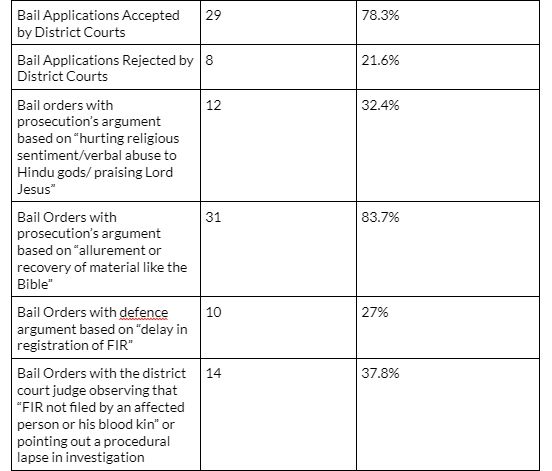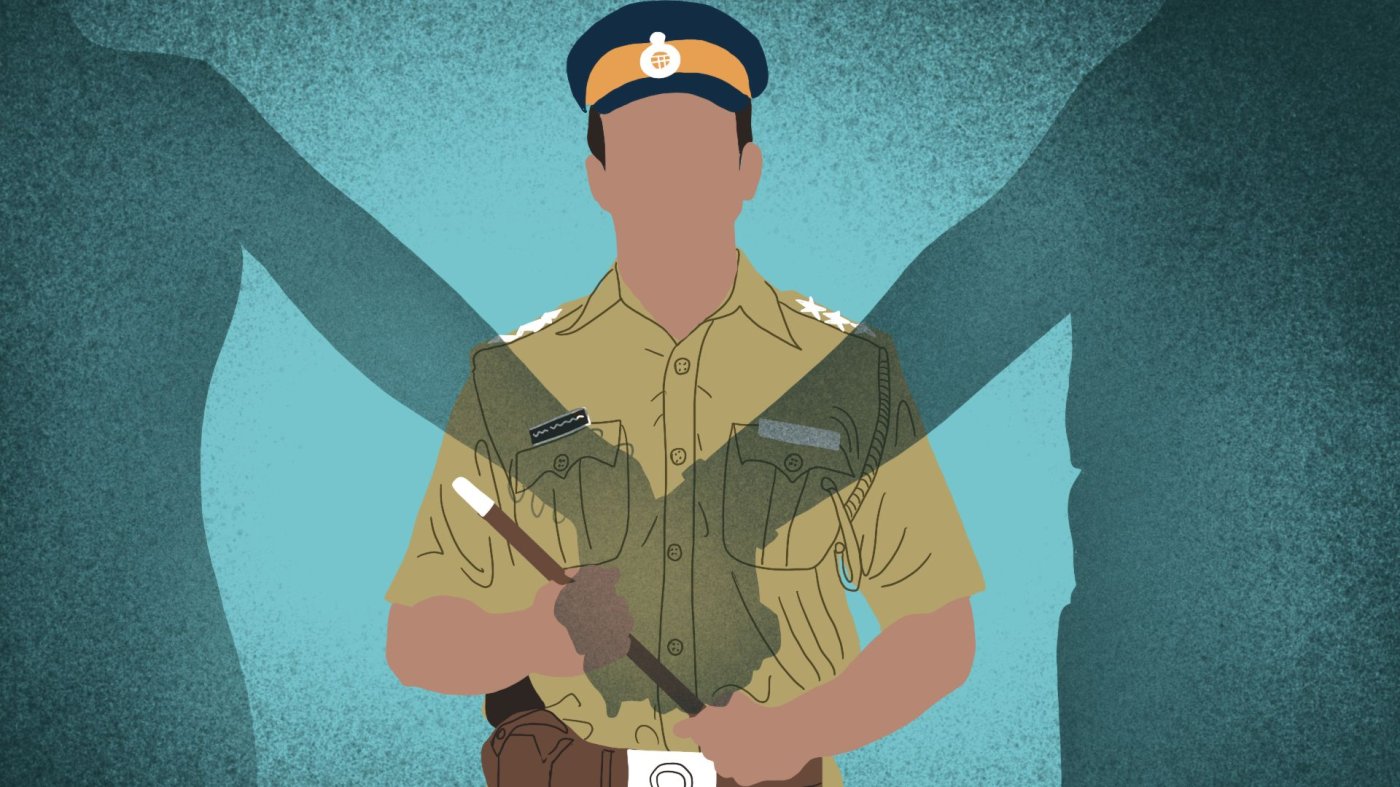Prayagraj: “Without expressing any opinion and commenting further on the merits and demerits of the case, there are enough grounds for bail to be granted in this case,” is an oft-repeated line in orders granting bail to people arrested under Uttar Pradesh’s anti-conversion law, Prohibition of Unlawful Conversion of Religion Act, 2021.
Of the 37 bail orders dated between January 2021 and June 2023 that Article 14 could access, district court judges granted bail in 29 (78.3%) cases.
Procedural lapses in filing first information reports (FIRs) to glaring loopholes in the investigation are among the reasons the district court judges cited while granting bail.
As Article 14 reported in the first of this two-part series, out of the 101 FIRs registered between December 2020 to June 2023 under the state’s controversial anti-conversion law, which we studied, 62% percent of complaints were found to be filed by third parties, parties not recognised as complainants under section 4 of the Act. As per the law, only a victim forced to undergo conversion or his/her blood relative can approach the police to register an FIR. The third part reports how Muslims are the main targets of “love jihad” accusations and are almost always refused bail by local courts.
The judicial scrutiny of FIRs and bail orders establishes how the law is being misused against the minority group of Christians in India’s largest state run by the Bharatiya Janata Party.
Some of the stark observations by the district court judges also include the fact that in some cases, the “accused are practising Hinduism as a religion”, raising questions on the intent behind the allegation of carrying out the religious conversion.
In eight cases where the bail application had been rejected, reasons cited by the district court judges included either recovery of the Bible, the prior criminal record of the accused, or fear of disrupting communal harmony.
Among other reasons cited while granting bail were the prosecution being unable to furnish any record regarding the prior criminal history of the accused, the gap between the date of incident and date of filing the FIR or time of incident not mentioned in the FIR, lack of statement by an independent witness verifying the prosecution’s version.
“Ultimately, such mindless exercises by the State and their police will have to be checked only by the trial magistrates and bail judges. One has to go through such a tortuous process to bring it to the knowledge of the misuse of the law,” Justice K Chandru, a former judge of Madras High Court, said,

But They Are Hindus & Sikhs
Of the 37 bail orders, the prosecution in 12 accused the arrested parties of “hurting religious sentiment”, “verbal abuse to Hindu gods” and “praising Lord Jesus”.
In a bail order dated 14 June 2022, Om Prakash Verma, a sessions judge at the Azamgarh district court said, “There is no independent eyewitness. The applicant (referring to the accused) has himself admitted to following Hinduism as a religion.”
The complainant in this case, Vipin Singh, affiliated with the Rashtriya Swayamsevak Sangh (RSS) and Hindu Mahasabha, had alleged that Deepchand alias Mohreel, a 60-year-old resident of Kuwadevchand Patti village in Azamgarh, had organised a pravachan (or religious congregation) at his place where “Hindu religion was abused and things were spoken in praise of Jesus”.
Speaking to Article 14, a family member of the accused Mohreel, who didn’t want to be named, said, “Only prayers were being conducted at that point in time. They (Bajrang Dal group) were threatening us to leave the church immediately and even resorted to verbal abuse, so Mohreel tried to pacify them.”
In another bail order from the Azamgarh district court, dated 24 August 2022, sessions judge Jitendra Kumar Singh said “from the examination of the FIR, it is clear that while the incident happened on 30 July 2022, the timing has not been mentioned in the FIR. The prosecution has been unable to provide details regarding the accused's prior criminal history. The accused belong to the Hindu religion and are women who have been lodged in jail.”
The incident had reportedly happened in Maharajganj village where it was alleged that one Indrakala, a 38-year-old resident of Pipri village, along with five other women, was “propagating Christianity and by criticising Hindu religion men and women were being incited to undergo religious conversion.”
The prosecution argued that resorting to “verbal abuse against Hindu religion and praising Jesus Christ” had led to the “religious sentiments of the complainant getting hurt”.
Recalling the events of that day, Indrakala, who spent a month in jail, said, “The occasion was that of my son's birthday and so a prayer meeting had been organised at my place. Someone spread a rumour that conversion is taking place here. When my landlady tried to intervene, she was made an accused in the case.”
In Bijnor, when Nitin Prajapati, district-level coordinator of the Vishwa Hindu Mahasangh alleged “forced conversion resulting in resentment among the Hindu and Sikh community”, the FIR had named two persons—Balvinder Singh and Chhindar Singh.
In a bail order dated 12 January 2023, sessions judge MP Singh said, “In this matter, prime facie, there appears no evidence of coercion and pressure for conversion. The applicants/accused are members of the Sikh community. No evidence is on record to show that the applicants/accused were forcing any person to convert to Christianity.”
Scathing Bail Orders
In two separate bail orders, dated 7 June 2022, special judge Shivchand of the SC-ST Court (a special court designated to hear cases filed under the Scheduled Castes and the Scheduled Tribes (Prevention of Atrocities) Act, 1989) in Azamgarh had said, “What exactly did the accused say about Hindu gods and goddesses that hurt the religious sentiments and how much money was offered as allurement has not been mentioned in the FIR. According to the Constitution, every person has a fundamental right to propagate his religion. This FIR has been filed by the local police station merely based on suspicion and speculation.”
The UP police alleged that two persons—Rausi Sukh and Vijay Kumar—who were preaching a congregation of 50-60 people had “said bad things about Hindu religion and by offering allurement tried to incite men and women to embrace Christianity”.
Rausi Sukh, a 28-year-old music teacher, resident of Harbanspur village in Azamgarh, who spent 28 days in jail, said, “It was a private place where Sunday prayers were taking place when the Hindutva outfit members had barged inside along with the police and began making videos. We had even shown them documents related to the trust managing the prayer house but to no avail.”
In another bail order from Raebareli district, dated 26 July 2021, additional sessions judge Vinod Kumar Barnwal said, “From the examination of the case diary, it is clear that apart from the complainant, there is neither any statement by an independent witness nor any other evidence except what the policemen are saying as part of the investigation.”
The complainant, one Shankar Lal, had alleged that a local, Shiv Kumar, “was telling people to tear posters of Hindu gods and follow Jesus”.
Recovery Of Material
There are 31 cases in which the prosecution’s argument is based on allegations regarding allurement given in lieu of conversion or recovery of books and literature related to Christianity, like the Bible. Those pertaining to the recovery of books based on Christian faith account for 14 bail orders.
Bail was rejected in four such cases.
In the case of Bhagwan Das and Pawan Kumar from Bareilly, a complaint by Himanshu Patel, a member of a “Hindu sangathan” (group), had been filed alleging they were “trying to brainwash people and luring them to embrace Christianity”.
Recovery of literature related to Christianity, including the Bible, was cited as grounds by the prosecution. Though the defence argued that the “accused were Hindu Jatavs with faith in Jesus out of their own will, " bail was denied owing to the criminal track records of both Bhagwan Das and Pawan Kumar.
On 1 June 2023, additional sessions judge Sunil Kumar Yadav at Kushinagar district court observed in a case related to forced conversion that “three Bible books and other objectionable material were recovered from the accused”.
Rejecting the bail application filed on behalf of Ajit Sharma, the judge said, “As per the IO, the investigation is still ongoing, and if the accused is let off, then he may not cooperate with the investigation hence, the bail application is rejected.”
Is the filing of FIRs or denying bail based on the recovery of religious study material problematic? There are differing opinions on this.
The former director general of police for UP, Vikram Singh, said, “Inclusion of the holy book of any faith and related material as part of the recovery depends on circumstances. If there are allegations of inducement and conversion then such recovery would complement the investigation.”
Justice Chandru said, “The Bible, the holy book of Christians, is freely available. How can one be charged on grounds of proselytization? Earlier in states like Madhya Pradesh, reverend sisters and female nurses were attacked, now, this is another form of threat to the Christian minority.”
Procedural Lapses
There are 14 bail orders with a comment from district court judges raising questions on the manner in which FIRs were filed, or investigation was done.
In six cases, the district court order accepted bail application because the FIR didn’t comply with the prerequisite condition as per section 4 of the anti-conversion law, which states that only the victim or his/her blood relatives could lodge an FIR.
On 10 April 2023, the sessions judge at the Kanpur district court, Sandeep Jain, while granting bail to the accused, 30-year-old Abhijit Massey, a social worker, said, “That the accused tried to make someone undergo religious conversion, no such evidence is available in the case diary yet. There is also no evidence that the accused received funds from a foreign country or distributed money among victims. The FIR has not been filed by the victim or his relative but by a Vishwa Hindu Parishad and Bajrang Dal worker.”
Arguments by the Defence
Among all the 37 bail orders, two strands are common in the argument made by the defence.
In 12 bail orders, the defence side argued that the FIR had been filed owing to personal enmity.
In nine bail orders, the defence referred to the fact that the complaint had been filed by a member affiliated with a Hindutva group. In three, the defence said it was done with “an intention of furthering political ambition” and one for “blackmailing.”
Delay in registering FIRs has also been mentioned as grounds for requesting bail by the defence.
A case with the defence argument based on the intention to cause harassment is from Ambedkar Nagar district.
In a bail order dated 31 May 2022, sessions judge Neha Anand said, “On 2 May 2022, the tilak ceremony of another accused, Virendra, had been organised. A false case has been registered only to stall the ceremony.”
In this case, the prosecution had alleged that when Arvind Pandey, prant pramukh of the Vishwa Hindu Parishad, had gone to Harnidih village he came to know that illegal conversion was taking place at the house of one Basant Lal.
The defence had argued that family members of Basant Lal had gathered at his home since it was his son’s tilak (pre-wedding) ceremony.
“If the applicant was keen on leaving Hinduism and embracing Christianity, he would have invited a Pope and made adequate arrangements,” the defence told the court.
Second of a three-part series. You can read the first part here and the third part here.
(Akanksha Kumar is a Delhi-based multimedia journalist who received the Human Rights and Religious Freedom Journalism Award in 2022.)
Get exclusive access to new databases, expert analyses, weekly newsletters, book excerpts and new ideas on democracy, law and society in India. Subscribe to Article 14.

